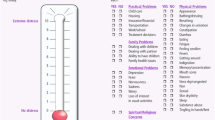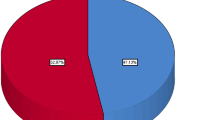Abstract
20–40% of cancer patients show emotional distress. Psychosocial support should be offered to severely distressed patients. However, little is known about the selection of patients to whom such support should be offered. This study investigated oncologists' ability to identify such patients. In a consecutive series of 298 cancer patients undergoing radiotherapy, distress, perceived social support and desire for supportive counselling were assessed using screening instruments. Simultaneously, 8 oncologists estimated patient distress and need for psychosocial support. A complete set of data was obtained in 80.2% of cases. Concordance of the oncologists' estimation of patient distress and perceived social support with the results of the screening instruments was weak (κ=0.10 and κ=0.05). Oncologists recognized the presence of severe distress only in 11 of the 30 severely distressed patients. Correct perception of distress was lower in patients with head and neck cancer and lung cancer and in lower class patients. Oncologists' recommendations for supportive counselling did not correlate with patient distress or the amount of perceived support but rather with progressive disease and less denial behaviour. Our results underline the need for educating oncologists in order to improve their ability to identify patient distress. © 2001 Cancer Research Campaign http://www.bjcancer.com
Similar content being viewed by others
Article PDF
Change history
16 November 2011
This paper was modified 12 months after initial publication to switch to Creative Commons licence terms, as noted at publication
References
Burnett AC and Thompson DG (1986) Aiding the development of communication skills in medical students. Med Educ 20: 424–431
Delvaux N, Razavi D and Farvaques C (1988) Cancer care – a stress for health professionals. Soc Sci Med 27: 159–166
Derogatis LR, Morrow GR, Fetting J, Penman D, Piasetsky S, Schmale AM, Henrichs M and Carnicke CLM (1983) The prevalence of psychiatric disorders among cancer patients. JAMA 249: 752–757
DeVries A, Söllner W, Steixner E, Auer V, Schiessling G, Sztankay A, Iglseder W and Lukas P (1998) Psychosocial distress and need for supportive counselling in patients during radiotherapy. Strahlenther Onkol 174: 408–414
Fallowfield LJ (1993) Giving sad and bad news. Lancet 341: 476–478
Fallowfield L and Jenkins V (1999) Effective communication skills are the key to good cancer care. Eur J Cancer 35: 1592–1597
Fallowfield LJ, Lipkin M and Hall A (1998) Teaching senior oncologists communication skill: Results from phase I of a comprehensive longitudinal program in the United Kingdom. J Clin Oncol 16: 1961–1968
Ford S, Fallowfield L and Lewis S (1994) Can oncologists detect distress in their out-patients and how satisfied are they with their performance during bad news consultation?. Br J Cancer 70: 767–770
Ford S, Fallowfield L and Lewis S (1996) Doctor–patient interactions in oncology. Soc Sci Med 42: 1511–1519
Hardman A, Maguire P and Crowther D (1989) The recognition of psychiatric morbidity on an oncology ward. J Psychosom Res 33: 235–239
Herrmann C (1997) International experience with the Hospital Anxiety and Depression Scale – a review of validation data and clinical results. J Psychosom Res 42: 17–41
Hoffman R, Payne D, Theodoulou M and Massie MJ (1998) Screening for anxiety and depression in women with breast cancer. Psychosomatics 39: 225–229
Hopwood P, Howell A and Maguire P (1991) Screening for psychiatric morbidity in patients with advanced breast cancer: validation of two self-report questionnaires. Br J Cancer 64: 353–356
Iscoe N, Williams JI, Szalai JP and Osoba D (1991) Prediction of psychosocial distress in patients with cancer. In: Osoba D (ed) Effect of cancer on quality of life, CRC Press: Boca Raton-Boston-Ann Arbor-London, pp 41–59
Kiss A, Cavalli F, Cull A, Gallmeier WM, Hürny C, Keller M, Kesselring A, Schwarz R, Söllner W, Spiegel D and Stiefel F (1995) Psychosocial/psychotherapeutic interventions in cancer patients: consensus statement. Supp Care Cancer 3: 270–271
Kleining G and Moore H (1968) Soziale Selbsteinstufung (SSE). Ein Instrument zur Messung sozialer Schichten. Kölner Z Soziol Soz 20: 502–552
Lambic C, Nordin K and Sloden PO (1995) Agreement between cancer patients and their physicians in the assessment of patient anxiety at follow-up clinics. Psycho-Oncology 4: 225–236
Logan J, DeGrasse CE, Stacey D, Fiset V and Fawcett L (1999) Oncology nursing education within a supportive care framework: an evidence-based undergraduate course. Can Oncol Nurs J 9 (2): 64–70
Maguire P (1999) Improving communication with cancer patients. Eur J Cancer 35: 2058–2065
Maguire P, Tait A, Brooke M, Thomas C and Sellwood R (1980) Effect of counselling on the psychiatric morbidity associated with mastectomy. BMJ 281: 1454
Maguire P, Booth K, Elliot C and Jones B (1996) Helping health professionals involved in cancer care acquire key interviewing skills – the impact of workshops. Eur J Cancer 32A: 1486–1489
Munro AJ and Potter S (1996) A quantitative approach to the distress caused by symptoms in patients treated with radical radiotherapy. Br J Cancer 74: 640–647
Muthny FA (1989) Freiburger Fragebogen zur Krankheitsverarbeitung. Beltz: Weinheim
Newell S, Sanson-Fisher RW, Girgis A and Bonaventura A (1998) How well do medical oncologists' perceptions reflect patients' reported physical and psychological problems?. Cancer 83: 1640–1651
Parle M, Jones B and Maguire P (1996) Maladaptive coping and affective disorders among cancer patients. Psychol Med 26: 735–744
Passik SD, Dugan W, McDonald MV, Rosenfeld B, Theobald DE and Edgerton S (1998) Oncologists' recognition of depression in their patients with cancer. J Clin Oncol 16: 1594–1600
Pendleton DA and Bochner S (1980) The communication of medical information in general practice consultations as a function of patients' social class. Soc Sci Med Med Psychol Med Sociol 14A: 669–673
Poulson J (1998) Bitter pills to swallow. New Engl J Med 338: 1844–1846
Putnam SM and Stiles WB (1993) Verbal exchanges in medical interviews: implications and innovations. Soc Sci Med 36: 1597–1604
Ramirez AJ, Graham J, Richards MA, Cull A and Gregory WM (1996) Mental health of hospital consultants: the effects of stress and satisfaction at work. Lancet 347: 724–728
Razavi D, Delvaux N, Farvacques C and Robaye E (1990) Screening for adjustment disorders and major depressive disorders in cancer in-patients. Br J Psychiatry 156: 79–83
Razavi D, Delvaux N, Marchal S, Bredart A, Farvacques C and Paesmans M (1993) The effects of a 24-hour psychological training program on attitudes, communication skills and occupational stress in oncology: a randomised study. Eur J Cancer 29A: 1858–1863
Rumpold G, Augustin M, Zschocke I, Strittmatter G and Söllner W (2001) The validity of the Hornheide Questionnaire for psychosocial support in skin tumour patients: A survey in an Austrian and a German outpatient population with melanoma. Psychother Med Psychol (in press)
Sensky T, Dennehy M, Gilbert A, Bergent R, Newlands E, Rustin G and Thompson C (1989) Physicians' perceptions of anxiety and depression among their outpatients: relationships with patients and doctors' satisfaction with their interviews. J Roy Coll Physicians 23: 33–38
Söllner W, Zingg-Schir M, Rumpold G, Mairinger G and Fritsch P (1998) Need for supportive counselling – the professionals' versus the patients' perspective: A survey in a representative sample of 236 melanoma patients. Psychother Psychosom 67: 94–104
Söllner W, Zschocke I, Zingg-Schir M, Rumpold G, Stein B and Augustin M (1999) Interactive patterns of social support and individual coping strategies in melanoma patients and their correlations with adjustment to illness. Psychosomatics 40: 239–250
Strittmatter G (1997) Indikation zur Intervention in der Psychoonkologie. Psychosoziale Belastungen und Ermittlung der Betreuungsbedürftigkeit stationärer Hauttumorpatienten. Waxmann, Internationale Hochschulschriften 228: Münster: New York
VanRyn M and Burke J (2000) The effect of patient race and socio-economic status on physicians' receptions of patients. Soc Sci Med 50: 813–828
Waitzkin H (1984) Doctor–patient communication: clinician implications of social scientific research. JAMA 252: 2441–2446
Worden JW and Weisman AD (1980) Do cancer patients really want counselling?. Gen Hosp Psychiat 2: 100–103
Zigmond AS and Snaith RP (1983) Hospital anxiety and depression scale. Acta Psychiatr Scand 67: 361–370
Author information
Authors and Affiliations
Rights and permissions
From twelve months after its original publication, this work is licensed under the Creative Commons Attribution-NonCommercial-Share Alike 3.0 Unported License. To view a copy of this license, visit http://creativecommons.org/licenses/by-nc-sa/3.0/
About this article
Cite this article
Söllner, W., DeVries, A., Steixner, E. et al. How successful are oncologists in identifying patient distress, perceived social support, and need for psychosocial counselling?. Br J Cancer 84, 179–185 (2001). https://doi.org/10.1054/bjoc.2000.1545
Received:
Revised:
Accepted:
Published:
Issue date:
DOI: https://doi.org/10.1054/bjoc.2000.1545
Keywords
This article is cited by
-
Predicting which patients with cancer will see a psychiatrist or counsellor from their initial oncology consultation document using natural language processing
Communications Medicine (2024)
-
Krebsmedizin im Wandel – Wo steht die Psychoonkologie?
Die Innere Medizin (2023)
-
Assessment of psychosocial difficulties by genetic clinicians and distress in women at high risk of breast cancer: a prospective study
European Journal of Human Genetics (2022)
-
Burden of depression and anxiety disorders per disease codes in patients with lymphoma in Germany
Supportive Care in Cancer (2022)
-
Considerations about risk of ongoing distress: what can we learn from repeat screening?
Supportive Care in Cancer (2022)



